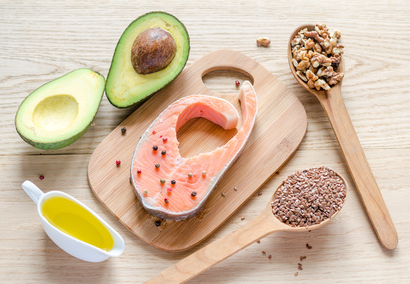If you have PCOS, you are likely to have gained extensive, even expert-like, knowledge on the importance of your carbohydrate metabolism.
Which is a good thing, as science has highlighted its close connection to PCOS symptoms and at the same time provided some brilliant means to improve symptoms via a suitable diet. For a holistic understanding of the disease, it seems, we should also know way more about another aspect of our metabolism: Novel research published in one of the most renowned scientific journals, “Nature”, by a team of Chinese scientists now reveals that our fat metabolism seems to play a vital role in PCOS as well.
Ye Tian from the Center for Reproductive Medicine, Ren Ji Hospital, School of Medicine, Shanghai Jiao Tong University, Shanghai, China, and his team examined the genetic profile of important enzymes of fatty acid metabolism in 1918 PCOS cases and 1889 age-matched controls. The researchers were particularly interested in members of the FADS family of enzymes, which are responsible for the conversion of essential plant-based oils to EPA and DHA, the omega 3 fatty acids contained in fish oil.
In the diet, there are three major forms of omega 3 fatty acids: ALA, from plant foods, and EPA and DHA, from animal sources including cold-water fish, seafood, egg yolks and animal liver. EPA and DHA are the active forms of omega 3. Your body must convert ALA to EPA or DHA for biological function. It is the above mentioned FADS enzymes and their genes that determine how effective this conversion is in your body.
The researchers’ data showed, that PCOS patients were likely to carry a specific genotype of these enzymes which was associated with decreased enzyme function and simultaneously higher testosterone levels.
Even though the underlying mechanisms are not clear yet, the data emphasizes the fact, that PCOS patients should not exclusively focus on a balanced carbohydrate metabolism, but can support their wellbeing effectively by increasing their awareness of their uptake of fatty acids as well. Seeing that PCOS patients have an increased risk of having less effectively working enzymes, this means, they should make sure they get enough omega-3, particularly from animal sources.
For optimum results, however, you also want to make sure not to consume too many omega-6 fatty acids either, as it is thought that it is the ratio between these two fatty acids, that is crucial for health benefits. The best ratio for optimal function seems to be 1:1. Yet, in our modernized, Western society, the ratio is closer to 16:1 and sometimes even 30:1 in favour of omega 6. Therefore, you want to increase intake of omega 3’s and decrease omega 6. Omega 6 is prevalent in processed, convenience and fast foods. So, you want to cut out on these, instead incorporating sardines and salmon (excellent sources of omega 3) 2 to 3 times per week into your diet.
Research has suggested that increasing omega 3 intake results in improved “free” testosterone levels in women with PCOS. It is this free testosterone that causes increased hair growth, acne and male-pattern hair loss. Also, taking omega 3 supplements may ameliorate biochemical parameters in PCOS such as LH, LH/FSH, and adiponectin. Interestingly, there are certain vitamins that can only be absorbed in the presence of fats. Vitamin D is one of them, which women with PCOS are often deficient in.
In summary, omega 3 fatty acids are an important element to add to your PCOS diet. Being aware of the fact that PCOS patients often do not have the enzymes allowing for effective conversion of plant omega 3s, you want to make sure that you prefer omega 3 from fish over plant sources.
If you find it hard to make sure you consume enough fish every week, you can be on the safe side by taking Fertilovit® F PCOS each day. It contains a highly specific composition of micronutrients tailored to meet the special needs of PCOS patients, including high quality fish oil.
References:
Mohammadi E1, Rafraf M, Farzadi L, Asghari-Jafarabadi M, Sabour S. Effects of omega-3 fatty acids supplementation on serum adiponectin levels and some metabolic risk factors in women with polycystic ovary syndrome. Asia Pac J Clin Nutr. 2012;21(4):511-8.
Nadjarzadeh A1, Dehghani Firouzabadi R2, Vaziri N3, Daneshbodi H3, Lotfi MH4, Mozaffari-Khosravi H1. The effect of omega-3 supplementation on androgen profile and menstrual status in women with polycystic ovary syndrome: A randomized clinical trial. Iran J Reprod Med. 2013 Aug;11(8):665-72.
Nadjarzadeh A1, Dehghani-Firouzabadi R2, Daneshbodi H3, Lotfi MH4, Vaziri N3, Mozaffari-Khosravi H5. Effect of Omega-3 Supplementation on Visfatin, Adiponectin, and Anthropometric Indices in Women with Polycystic Ovarian Syndrome. J Reprod Infertil. 2015 Oct-Dec;16(4):212-20.
Oner G1, Muderris II. Efficacy of omega-3 in the treatment of polycystic ovary syndrome. J Obstet Gynaecol. 2013 Apr;33(3):289-91. doi: 10.3109/01443615.2012.751365.
Phelan N1, O’Connor A, Kyaw Tun T, Correia N, Boran G, Roche HM, Gibney J. Hormonal and metabolic effects of polyunsaturated fatty acids in young women with polycystic ovary syndrome: results from a cross-sectional analysis and a randomized, placebo-controlled, crossover trial. Am J Clin Nutr. 2011 Mar;93(3):652-62. doi: 10.3945/ajcn.110.005538. Epub 2011 Jan 26.
Ye Tian, Wei Zhang, Shigang Zhao, Yinhua Sun, Yuehong Bian, Tailai Chen, Yanzhi Du, Jiangtao Zhang, Zhao Wang, Tao Huang, Yingqian Peng, Ping Yang, Han Zhao & Zi-Jiang Chen. FADS1-FADS2 gene cluster confers risk to polycystic ovary syndrome. Scientific Reports 6, Article number: 21195 (2016), doi:10.1038/srep21195








Thank you very much for your blog.
I enjoyed reading this article.
Such a nice blog.
I have read an amazing article here.